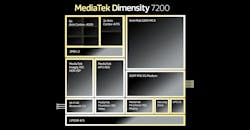Sophisticated SoC Targets Midrange Smartphones
This article appeared in Microwaves & RF and has been published here with permission.
Check out more Mobile World Congress 2023 coverage.
MediaTek followed up its Dimensity 9200 announcement with the Dimensity 7200 system-on-chip (SoC) that’s aimed at smartphones and tablets (see figure). The 2.8-GHz chip is based on TSMC’s 4-nm chip technology and sports a multicore collection that includes dual Arm Cortex-A715 cores, six low-power Cortex-A510 cores and an Arm Mali G610 MC4 GPU with improved gaming functionality, including support for 144-Hz displays. The GPU is augmented with an Imagiq 765 HDR-ISP.
The Imagiq 765 image signal processor (ISP) brings camera features like 4K HDR video and real-time large aperture depth-of-field effect and reality depth of field (DoF) to support creative special effects to each layer as well as dual-camera zoom. It provides Hybrid Autofocus with phase-detection auto-focus (PDAF) and laser auto-focus plus pixel-level auto-focus for faster focusing.
The ISP includes a De-Mosaic and Sharpness Engine that can recognize large-scale texture. It supports adaptive color imaging for smoother and sharper images, which can be useful in dimly lit environments. The automatic image stabilization (AIS) works to eliminate blur by analyzing four consecutive images. The ISP also works with RWB sensors with its TrueBright Engine for additional low-light support. MediaTek APU 650 machine-learning accelerator also targets image processing.
The 5G support operates at downlink speeds up to 4.7 Gb/s. It can handle dual 5G SIMs and dual Voice over New Radio (VoNR). This helps reduce latency while improving audio and video quality. The MediaTek 5G UltraSave 2.0 technology is designed to provide these services while reducing power requirements, thereby increasing battery runtime.
Wi-Fi 6E also is part of the equation—it takes advantage of the 6-GHz band in addition to the 2.5- and 5-GHz bands. There’s support for the latest routers and mesh networking, and Bluetooth 5.3 functionality handles the latest protocols such as Bluetooth LE.
Read more articles from our Mobile World Congress 2023 coverage.


